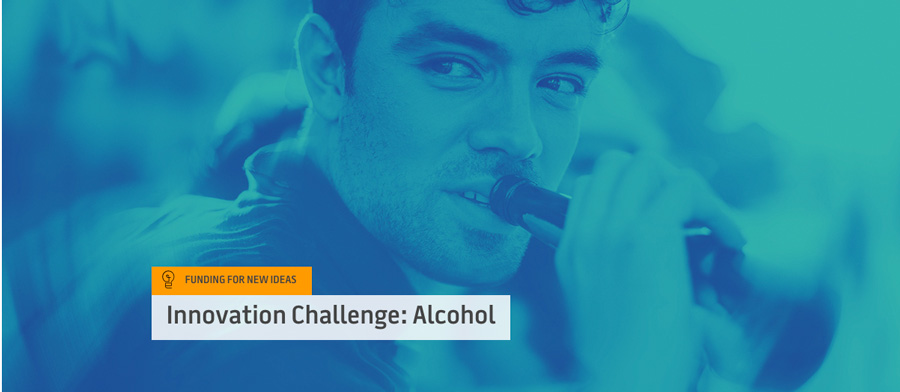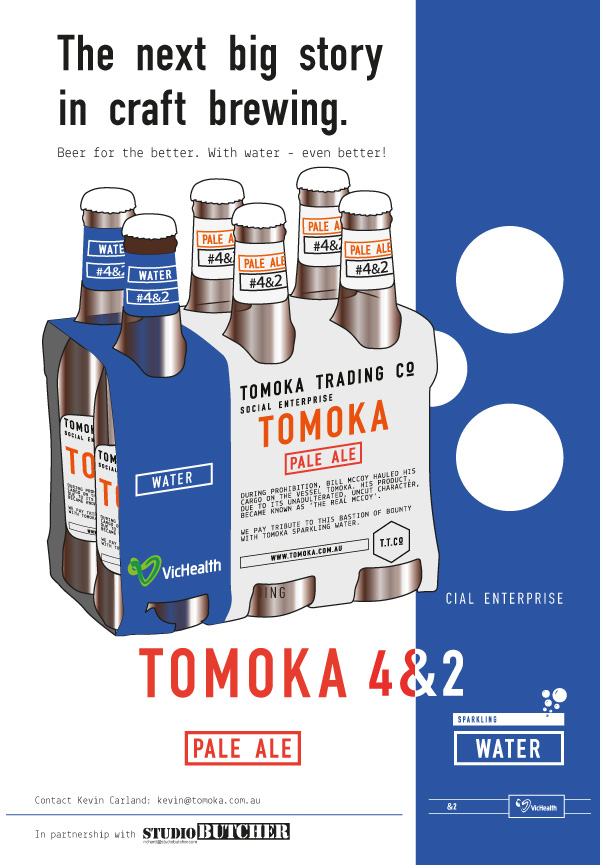Overview

The 'Challenge'
Over a third of Australians think alcohol is a serious issue facing our community. VicHealth thought it was time to do something about it.
About the Challenge
The VicHealth Innovation Challenge called for ideas to help change Victoria's drinking culture by either
- Reducing the amount Victorians drink, particularly those who drink a lot, often, or;
- Increasing the acceptability of saying no to a drink, or drinking a bit less.
Video
Summary
MixPacks provide alcohol consumers with an easy way to choose to drink their alcohol a little more moderately within existing social and cultural structures by encouraging consumption spacing over longer periods of time.

Challenge Criteria
Prevent harm from alcohol
The capacity of the project to enable a better drinking culture in Victoria by getting heavy drinkers to drink a little less, or by increasing the acceptability of non and moderate drinking.
Innovative
The project uses an innovative approach to change the way Victorians drink.
Partners
The project team possesses relevant skills, experience and partnerships to take the project from idea to implementation.
Equity
The project is fair, accessible and inclusive (as described in the VicHealth Fair Foundations Framework
Extract: SOCIOECONOMIC, POLITICAL AND CULTURAL CONTEXT
- Dominant cultural and societal norms and values constitute an important part of the context in which policies are developed and implemented. Examples include the value placed on health as a collective or individual responsibility, the perceived role of women in society, and the value of upholding international obligations and treaties on human rights.
- Which cultural and societal norms and values generate or perpetuate social hierarchies by favouring, advantaging, excluding or degrading some people or groups? Where do these norms and values come from? How could they be challenged or changed? How could you meaningfully engage affected groups, to build capacity and advocate for change?
Scalability
The project has the potential to be scaled up and/or replicated making a difference over the long term.
Sustainability
The project has the potential to draw investment and support from government, not for profit, philanthropic and private sector organisations, without long term investment from VicHealth.
Sharable
The project lends itself to digital technology and social media, maximising opportunity for stakeholders to share content with their extended networks.
Roll-out
The proposal is likely to achieve its intended objectives within the specified timeframes.
Business Model Canvas
1. Key Partners
Partner with an established distributor
To build our case, we need a beer producer as a partner. One that is responsible, is nimble and has access to the type of drinker that will embrace this opportunity. We have found that partner in Tomoka.
They market quality beer, sourced from reliable brewers to a discerning market. They understand the value of creating stories to build communities and they are a company that has Social Responsibility as part of their DNA.
- MixPack Product
- Brewer for Tomoka Trading Co.
- Water supplier
- Packaging supplier
- Distributor
- Tomoka Trading Pty Ltd
- Water supplier
- Bottle Recycler
- Marketing
- studioButcher Design and Marketing Consultant
- Craft beer trade shows
- Vichealth
- Retail outlets
- Alcohol bottle shop outlets
- Restaurants
- SROI analysis
- Consultant (tba) to build a model to measure and report actual benefits
- Social enterprises
- Charitable donation recipient - such as Tomoka's relationship with KUC
- VicHealth
- Licensing
- License to other brewers
- Government agencies
- Legal advice
- IP Australia
- Patents and Design Registration
- Federal and State Government
- Accounting
- ATO
- CPA
2. Key Activities
Demonstrate to the alcohol industry that enabling responsible drinking can be a profitable business strategy.
That brewers can be seen to be part of the solution.
So we have to carefully measure and report the results. What has worked, what change we have made, and what impact that has had on the community at large. And so, to test our success in harm prevention, we will develop a model to measure the social return on investment.
And obviously VicHealth will be an important partner in this venture, should we be successful in securing your investment.
- Partnership
- Tomoka Trading Co.
- Licensing new partners
- Stock
- Minimum Run
- Ongoing 'JIT' Ordering
- Storage and Distribution
- Marketing
- Market Research
- Website build & maintenance
- Packaging
- Exhibitor stand for shows
- Launch events
- Trial 10,000 litres (1000 cases)
- Press calls
- Social media
- Sales
- Develop Sales / Training Kit
- Recruit Sales Team
- Manage enquiries
- Record & action orders
- Accounting, tax and audit
- ATO
- CPA
- Audit agency
3. Key Resources
We don't want this to be a product that relies upon grants and government funding into the future.
Our vision is for a model that is robust enough to stand on its own two feet.
- Beer & water supply
- Tomoka Trading Co.
- Micro-brewer quality beer
- Quality water (Sparkling)
- Packaging
- 6-Pack wraps
- Printed bottle labels
- Printed cartons
- Sales kits
- Tasting kits
- Branding
- Marketing
- Design services
- Digital media
- Press & PR
- Sales
- Manager/representatives
- Analysis tools
4. Value Propositions
MixPack is a unique approach because it effectively minimizes the need for regulation. We can help drinkers make the smarter choices that many of them actually want to make.
This will help to change the common perception among drinkers that tempering consumption is anti-social.
This concept is tackling excessive drinking at the source of the problem... early intervention and prevention has to be a better approach that dealing with the aftermath of sustained and excessive alcohol consumption.
We've been thinking about this for a long time, and exploring the idea in our own scenarios with sobering outcomes!
